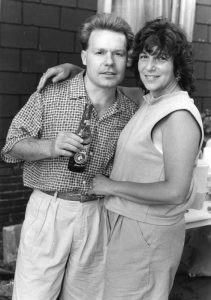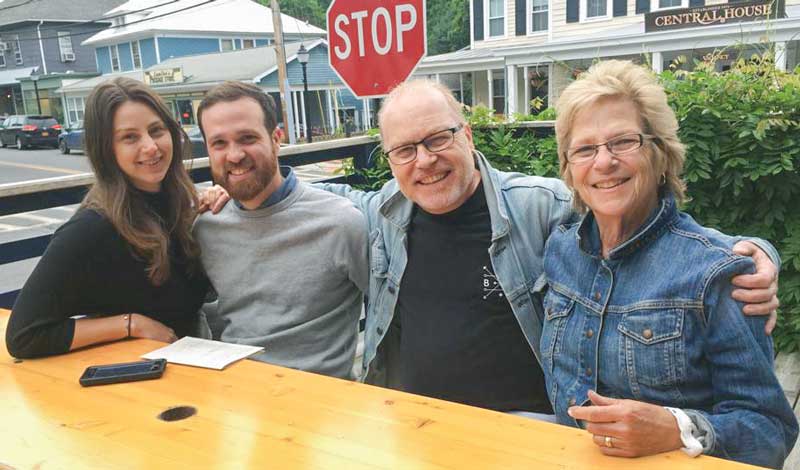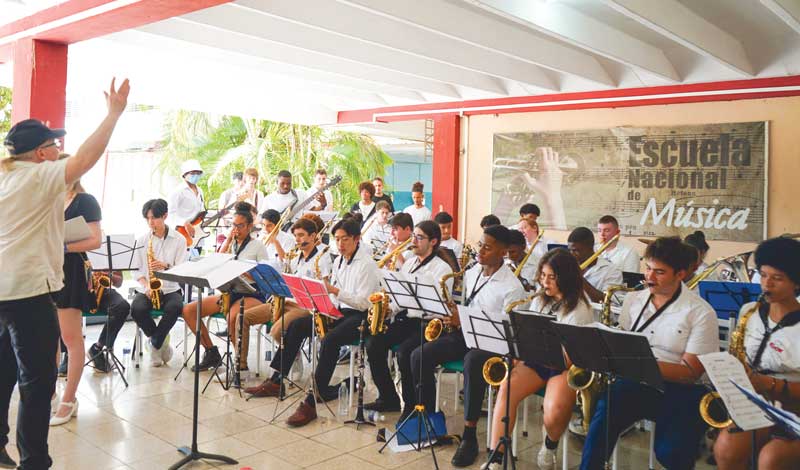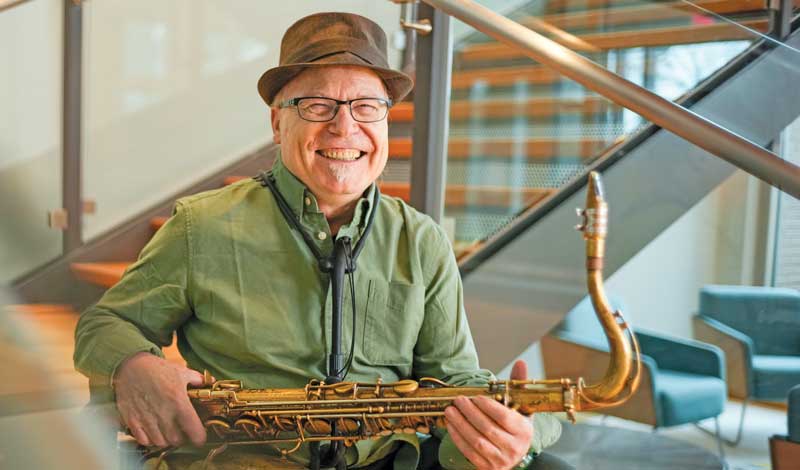Living Buddhism: Philippe, you recently returned from a two-week tour of Cuba with your students—a first for your school, which you conceived and spearheaded. Little exchange is permitted with Cuba, on which the U.S. maintains an enduring economic embargo. How and why did you decide to take your students there?
Philippe Crettien: Where to begin? I think I’d have to say that my journey to Cuba began as a journey within, to my deepest roots. For the sake of time, I’d say it began a decade back, in 2015, when Rose, my friend and wife of 40 years, began showing symptoms of Alzheimer’s disease.
The changes can be dramatic.
Philippe: They can be, but they don’t come all at once. What is lost is lost in pieces, big and small. And every piece of Rose that was lost took a piece of me with it.
In July of 2019, I checked her in to full-time care—maybe the most dramatic day of my life. She understood somewhat, and then I came home, alone to our family home of over 30 years, and was overwhelmed by memories.
On instinct, frantic and unthinking, I searched our home, turned upside-down by Rose’s illness, for the Gohonzon.

You’d stowed it away.
Philippe: Yes. We’d stopped chanting four years earlier, in 2015, two years before her diagnosis, but already into the middle stages of the disease. As I said, it took from her slowly, little things at first—minor memories, like a brunch date with a friend, or where she’d put a hat or recipe. Then bigger things, like the name of a friend, of the street she was on, of the town she was in. The decline was rapid, and on instinct I denied it—sheltered her, or tried to, from the facts. I took over the tasks she’d always done—cooking, cleaning, washing. Quickly, before we realized it, we’d become totally isolated. She stopped working, then stopped leaving the house. We moved our bedroom downstairs (the stairs had become a hazard), which we reorganized and minimized. Among the things we decided could go into storage was the altar, and the Gohonzon with it.
But you and Rose had been practicing for years, decades.
Philippe: That’s only half-true. Actually, Rose and I stepped away from the SGI in 1990, during the turmoil wrought by the priesthood issue.[1] I was in my mid-20s, a Brass Band leader and a new father of two. The organization was so different back then—explosively youthful, but moving at a breakneck speed that I could not maintain. Ikeda Sensei had come in February 1990, in fact, to align the organization with its founding principles—with its mission as a movement of and for the people. But by that time, Rose and I were gone. We continued to chant, but on our own; for the next 30 years, we practiced at a distance from the SGI community.
But here’s the thing, you can’t practice Buddhism on your own. You think you can—we did—but this is a religion of human revolution. Stepping away from the community that has human revolution as its central aim is a sure way to avoid doing your own. Slowly, personal strategies run aground, and you do not even realize that you’ve grounded to a halt.
In any case, our fortune dried up. We took apart our altar, rolled up the Gohonzon and set aside our faith. By 2017, we’d begun seeing an Alzheimer’s specialist, and by 2019, she gave it to me straight: The illness had progressed far further than I was willing to admit. “Philippe,” she said, “you can’t keep this up. You’re going to have a heart attack.”

What did you do?
Philippe: Chant. The day I checked my wife into 24-hour care, I chanted—for the first time in four years, I chanted—and lost track of time. At some point, I felt this hope rising within me and knew what I wanted to do. I began poring through my contacts for the names of old friends of the SGI, some I hadn’t spoken to in years. And I began reaching out to them, one by one.
Over the course of the following week, they came over, in ones and twos. Some had kept in touch with us over the years, but there were others who hadn’t heard from me in decades. Perhaps sensing it would do me good to get out of the house, a friend of my youth, now a men’s leader, asked me over. “Come in, come in,” he said when I got there, “I’ve been chanting for you for 30 years.”
It was a difficult time, no doubt about it. My kids were in denial about the decline of their mother—they estranged themselves from me and their mother, unable to take ownership of the truly painful situation. But it was also a radiant time. An extraordinary time. I took on leadership immediately, knowing that “practice for self and others” was my golden ticket to my human revolution. And I was practicing as I never had before, connecting with Sensei, not as a follower, but as a disciple, striving for kosen-rufu as a Bodhisattva of the Earth. Painful as it was, my life was opening up, and from it something new was coming into being. And it expressed itself in music.
You were in school, is that right?
Philippe: I was. Working full time and completing my master’s in composition. In a moment of clarity just before her diagnosis, Rose had nudged me to pursue my studies. I did, and in 2019, after checking her into 24-hour care, I began composing a large orchestral work—my first—as a tribute to Rose and my roots.
What do you mean by that?
Philippe: On one level, I mean my childhood—I grew up in North Africa, the son of a French diplomat, and have as my early memories the sounds, streets and people of Egypt, Morocco and Algeria. Most fondly, I remember playing soccer in the streets around the embassies with other children. The kids were Russian, Algerian, Spanish, French. Whatever tensions there were among the grown-ups, they didn’t concern us. The only real difference, the only one we felt, was of privilege. We children of diplomats went home to different conditions than those of the local kids. In any case, as I composed this music, this tribute, I brought Rose with me, to these places I’d lived before I’d met her—the few places I’d lived without her.
What drew you to her 40 years earlier?
Philippe: Well, for whatever reason, there was something about her—a fierce independence that set her apart. And then there was the way she saw people. She saw what others did not, what had not quite yet come to be, and worked patiently and passionately to bring it into view. For years she worked with deaf and special-needs children, and considered it her duty to show the world the potential it was blind to. She worked wonders, helping many, many children contribute to their communities and society. In any case, as I reconnected with my faith and my mentor, I began to see myself as Rose might have, as a person with their whole life ahead of them, with huge amounts of untapped potential the world was waiting to see.
In 2020, I submitted my composition to various institutions and competitions. Through the French embassy, the piece reached renowned Cuban jazz pianist Roberto Fonseca who invited me to play in Cuba. I went and was invited to visit again. I suggested that I come back, not alone, but with my students, an idea that was welcomed wholeheartedly.
The proposal would take some time to come to fruition. It would be a first for the school, which had historically taken all such trips to Europe, to perform with the children there. These were wonderful experiences for the kids, but never in their lives had they traveled to a country like Cuba, whose children have nowhere near the resources that they do.
There was some pushback and even alarm from administrators and parents, but I had the trust of the head of school. “This will be a game changer,” he told me. “I’m coming with you.”
We teamed up with the jazz director of another school and began working together with our kids on an original piece by Oscar Stagnaro called “Mariella’s Dream.” I sent the same piece to my friends in Cuba, who coordinated with a music program there. We all began to practice, Cuban and U.S. students, in preparation for our visit slated for the spring of 2024.
How’d it go?
Philippe: The kids had many opportunities to perform, with the itinerary including a performance at the Museum of Modern Art in Havana, the National School of the Arts at the Escuela Nacional de Música and two master classes on Cuban music with master musicians. Lastly, we would record “Mariella’s Dream,” the piece we’d all been practicing so hard, in Havana’s iconic Abdala recording studio.
As you can imagine, coordinating some 47 young travelers throughout Cuba is no minor undertaking. Each morning, I began by chanting in my hotel room, praying for total victory and the safety and good health of the kids. Unfortunately, nearly a quarter of my students fell ill—several caught a virus in Boston just prior to takeoff and throughout the trip infected each other in their hotel rooms. My incredible team of chaperones took daily trips to the hospital in Havana to get treatment for the kids falling sick. American cell phones don’t work in Cuba, and there is sporadic internet. From one designated computer, I replied to the barrage of emails from worried parents. My abundant daimoku and daily Buddhist study enabled me to keep a level head, resolving one problem after the next. Facing these crises, I studied my April 2024 Living Buddhism over and over, which included this quote from Sensei:
When our fundamental mindset changes, we ourselves change. And when we change, the environment and the world change, too.
The source of this great transformation is found nowhere but in a radical deepening of our own chanting of Nam-myoho-renge-kyo to the Gohonzon. This sort of prayer to the Gohonzon is completely different from that found in a dependent, supplicant faith; we do not weakly and passively beg someone for salvation or assistance.
Prayer in Nichiren Buddhism is fundamentally a vow. It is a pledge or commitment to follow a chosen course of action; it is a declaration to challenge a clear objective. (March 17, 2006, World Tribune, p. 3).
I read this many times, gaining the strength to win over every obstacle that came my way.

Was there any tension among the students?
Philippe: I expected there would be—understand that the children there suffer from the U.S. embargo; materially, they have little, while we have much. I knew my entourage—several dozen private arts students from America—would necessarily represent for the Cuban kids the material abundance they themselves are denied. I discussed my worries with my men’s leader, the one who’d been chanting for me all those years I’d been gone, and he suggested that I bring them gifts. “It will mean the world to them,” he said. So we did—we brought mouthpieces for the saxophones, strings for guitars. And there was not a shred of resentment, not even a touch of coolness. The Cuban kids were beaming throughout, all smiles, all appreciation.
Few of my students speak Spanish, and few of the Cubans spoke English. But they spoke a common language—music. We were welcomed so warmly at the National School of the Arts. The Cuban master musicians and their students performed for us and we for them. They taught us Afro-Cuban music and we taught them jazz. I could tell that all this was a priceless, humbling experience for the students.
How did it end?
Philippe: Everything culminated in a daylong recording session of “Mariella’s Dream.” I was directing a large ensemble of 47 students.
To my surprise and delight, Roberto Fonseca himself welcomed us warmly, put us at ease and wished us the best. All the while, in the mixing room off in the wings, an important meeting was taking place. Apparently, news of our tour had reached the director of Cuba’s 37 arts schools. She’d come to see us in action. I met her there, thanked her deeply for coming and returned to the studio, where I took stock of the kids. For sure, they’d looked better. On the final leg of our long journey, they seemed about ready to fall asleep in their chairs. Perhaps this was why a tricky odd meter gave us so much trouble. By mid-afternoon, we still hadn’t nailed the piece. But this was it—the final push for the big prize, the fruit of all our efforts—a recording to bring home from this unforgettable trip. All eyes were on me.
Sensei’s spirit pulsed in my heart: “Never be defeated no matter what! Shower your friends with courage and hope. Be a king who dares, be a king who strives!”
Through the chaos, I listened with all my might for where the music was derailing and located it in the rhythm section. Beginning here, I worked through the odd meter again and again until the rhythm section was united and could follow me in and out of that portion of the song.
I brought the rhythm section back into the fold for a full run-through, guiding a tremendous first and second take of the entire composition. No one was exhausted then—all the kids were spent, yes, but they were beaming, laughing, clapping each other on the back. I went around to shake the hand of every kid, while those in the mixing room, including the Cuban Arts Schools Director, stepped out, cheering, the whole room filled with applause.
What about the kids—your own, back home?
Philippe: We’d begun talking by then. They’d overcome their shock at their mother’s illness and begun to come to terms with the situation. I think watching me overcome one obstacle after another to gain a second lease on life—rare for partners-
turned-caretakers of those with Alzheimer’s—was almost shocking to them. Because while I was grieving, I was also happy.
Rose declined rapidly that summer and in August was admitted to hospice. The kids came then, and in the wee hours of the 25th, we gathered together to chant for Rose to pass peacefully, happily. Then we slept. In the morning, we got the news that she was gone. We went to see her together and were stunned. She was smiling. My son could not help but chuckle. “That’s amazing,” he said.
If you had to guess, what was she smiling about?
Philippe: I think she was smiling about me—about us—about our family. According to Buddhism, Rose and I have been a part of one another’s lives, in one shape or another, for an eternity. And lifetime after lifetime, we have brought each other to the Gohonzon, to a deeper grasp of our Buddhahood. In her illness, she prompted me to go deep, to reawaken to my mission as a Bodhisattva of the Earth, to unite my family and reveal my potential.
From the June 2025 Living Buddhism
References
- On November 28, 1991, the Nichiren Shoshu priesthood excommunicated more than 12 million SGI members in an attempt to wrest control of the lay organization and its resources. The priesthood had advocated a doctrine of absolute superiority and authority of priests over laity, contradicting the spirit of equality that pervades Nichiren Daishonin’s teachings. The majority of members worldwide recognized the corruption and distortion behind the priesthood’s actions and continued practicing within the SGI under the leadership of Ikeda Sensei. November 28 is now celebrated as SGI’s “Day of Spiritual Independence.” ↩︎
You are reading {{ meterCount }} of {{ meterMax }} free premium articles

